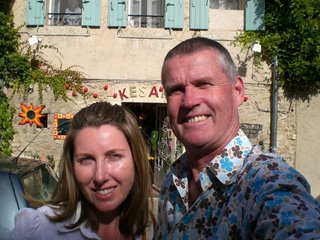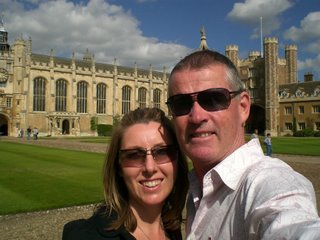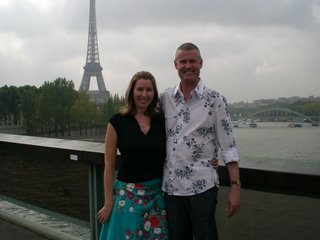 We're thinking about home now. And pretty soon, we'll be there. It's twelve weeks now since we left Auckland, and we have both come over all reflective about the trip, and life in general.
We're thinking about home now. And pretty soon, we'll be there. It's twelve weeks now since we left Auckland, and we have both come over all reflective about the trip, and life in general. Sandy says - and I agree - that had we planned this trip six months or a year in advance, researched and pre-booked everything, got it all organised; we could not have had a better trip than we have had doing the opposite: making it up as we go along.
 When we tell people this - people we meet on our travels - they have one of two reactions. They either think it is fantastic that we don't know where we're going next, how long we're staying or how we're getting there; or they are shocked and quietly appalled. With the latter type of person you can see it in their eyes that they would never want to travel this way themselves, and they think we're slightly odd.
When we tell people this - people we meet on our travels - they have one of two reactions. They either think it is fantastic that we don't know where we're going next, how long we're staying or how we're getting there; or they are shocked and quietly appalled. With the latter type of person you can see it in their eyes that they would never want to travel this way themselves, and they think we're slightly odd. To be honest it took me a while to get into the idea, too. Anyone who has travelled with me will tell you that I do like to research when I travel, particularly when it comes to food. I really hate the idea of missing an opportunity to eat something good, and leaving it to chance doesn't sit well with me. I hate wasting a mealtime on mediocre food.
 I call this the Estasi effect. Estasi is a restaurant on Ponsonby Road in Auckland. It's an OK kind of a place, but nothing special. If you wandered in there as a tourist and had dinner, you'd probably think: well, that was OK, but quite forgettable. The thing is, Estasi is right next door to Prego, one of my favourite restaurants, and one of the classic restaurants of Auckland (it's just celebrated its 20th birthday, which is like a hundred years in the Auckland restaurant scene.) If you wandered into Prego instead of Estasi, you would be treated like someone special by the superb staff, you would eat excellent casual Italian food, drink good wine and generally leave feeling: wow, that was a really good experience from the moment I walked in the door. And the difference between these places is really only a few metres. So when you're in a foreign country, how do you know which is the Prego and which is the Estasi? This has caused me a few moments of anxiety as I contemplated potential treats missed.
I call this the Estasi effect. Estasi is a restaurant on Ponsonby Road in Auckland. It's an OK kind of a place, but nothing special. If you wandered in there as a tourist and had dinner, you'd probably think: well, that was OK, but quite forgettable. The thing is, Estasi is right next door to Prego, one of my favourite restaurants, and one of the classic restaurants of Auckland (it's just celebrated its 20th birthday, which is like a hundred years in the Auckland restaurant scene.) If you wandered into Prego instead of Estasi, you would be treated like someone special by the superb staff, you would eat excellent casual Italian food, drink good wine and generally leave feeling: wow, that was a really good experience from the moment I walked in the door. And the difference between these places is really only a few metres. So when you're in a foreign country, how do you know which is the Prego and which is the Estasi? This has caused me a few moments of anxiety as I contemplated potential treats missed. But as it has turned out, not having a plan has been an excellent plan for us. Sure, we have had a few mediocre meals, but in general our restaurant radar has worked well. And we have had very few situations where we've been caught out, logistically, by not having a plan. On balance I think it has worked in our favour more than it has been a problem. Each decision has led to another opportunity.
There has been the odd glitch of course. Paris springs to mind; we decided to stay an extra night so we could make plans to go to Provence. What we didn't reckon on was the whole of Paris (apparently) being booked out because of September trade fairs. Add to that an unusually unhelpful tourist information centre ("All the hotels are full. I can give you a list and you can try calling") and we were wandering the streets, wondering what to do. This is where having a generous travel budget comes in handy. In Paris, we wandered into the Edouard VII hotel on the Avenue de l'Opera and asked if they happened to have a room. "Non," was the answer, but then "Oui," it became, as there had just been a cancellation. Hooray! We were saved. It was a lovely room, in a lovely hotel. It cost 450 euros. But at least we had a bed for the night.
In Barcelona we inadvertently wanted to leave the day after a Barcelona-Chelsea football match, when thousands of English football fans also wanted to fly to London. Gone were the 39 euro fares; full price was all that was available.
 But other times these types of situations have become our reason to change our plans. If the place we thought we were going to stay was too busy, we took it as a sign to move on somewhere else. When it rained, we headed inland instead of to the coast. if we liked a place, we stayed on longer. These are things we could not have done had we been racing to meet the deadline of our next booking.
But other times these types of situations have become our reason to change our plans. If the place we thought we were going to stay was too busy, we took it as a sign to move on somewhere else. When it rained, we headed inland instead of to the coast. if we liked a place, we stayed on longer. These are things we could not have done had we been racing to meet the deadline of our next booking. It must be said that it's easier to travel with no plan when you're prepared to spend a bit. Because yes, we have spent a lot of money. More than many people (us included, under normal circumstances) would realistically dream of spending on an overseas trip. We have said "Thanks, Skoop", many times. It's become a regular toast.
The other luxury we have is time. Who goes away for three months? It's a great feeling knowing there are weeks and weeks ahead of you and nothing definitely planned to fill them. Probably especially for me, since my normal working life is ruled by endless, iron-clad deadlines. It feels truly luxurious to say "Where shall we go today?", and if we feel like it, to do absolutely nothing. I'm really glad we didn't have to try and fit four countries into four weeks, or six weeks, or whatever. I've met too many people who are spending their vacations racing the clock. Gotta see this, gotta go there, gotta do it all before we have to go home. I hate that feeling. I have really enjoyed the times we've just hung out. Just sat, watched the world, soaked it in. You can't do that on a deadline either. Or at least I can't.
So time and money, time and money. Throw these things together and you do have the makings of a pretty unforgettable trip. But there's also been a lot of luck, a lot of wondrous, crazy serendipity. I'll write more on this later.
Looking back I don't think I would have wanted my first European adventure to be any other way. Europe is an expensive place; it just is, whatever the exchange rate . I don't see how you can do it on a meagre budget. (Well, I do see HOW you can do it, and it involves backpacks and velcro sandals. No thanks.) Even living simply, as we have done, really, costs money. A coffee is the same in euros as it is in pounds as it is in dollars; there are very few items which are cheaper once you do the conversion. Wine in France is the only one I can think of, actually. (Which is no small thing, I might add).
No comments:
Post a Comment